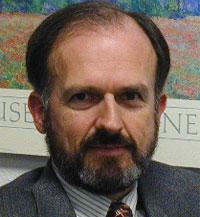NSF Grant Enables UCI Computer Scientist to Begin Building a New Science of Design
04.07.05 -- A new interdisciplinary science is being forged with help from the National Science Foundation (NSF). The Science of Design will transform the way complex software-intensive systems, everything from autos and rockets to web applications, are designed. As a result, tomorrow's systems will be more flexible, more reliable and faster to market, and many more products and applications will emerge.
|
NSF has awarded ISR's Director Richard N. Taylor $775,000 to help establish a set of teachable scientific principles to reinvent software design. Taylor's proposal will extend work on the REST (REpresentational State Transfer) software architectural style formulated by Taylor's student Roy Fielding in his 2000 dissertation. The REST style underlies today's World Wide Web and its primary protocol HTTP/1.1, which is familiar as the .http:// in Web addresses. REST gives software designs highly desirable qualities prized by software engineers, such as extensibility, flexibility and performance.
The outstanding success of the World Wide Web has caused many software designers to adopt the REST style, said Taylor. Taylor's proposed research will help designers reliably apply REST to a wide variety of decentralized and distributed applications. Air traffic control and emergency response systems, for example, operate with decentralized command and control. Taylor's research team will provide teachable design principles, practices and supporting tools.
By involving the larger community through open-source projects and by generalizing to other proven architectural styles, the research will empower developers broadly to adopt good design practices.
Past and current ISR experiences in developing real-world RESTful applications will be applied to the new design research, including key activities with the Apache Software Foundation. The Apache Web server, used by over 60 percent of public Internet Web sites, was developed by the Apache Group, an open-source project in which Taylor's group has been active since 1993.
Taylor's former student, Roy Fielding, Ph.D., currently chief scientist with Day Software, led the Apache group in developing the HTTP/1.1 protocol. Justin Erenkrantz, active in the design and development of the Apache HTTP server since 2001, will be a lead researcher in Taylor's NSF project.
By awarding this sizable amount to a single investigator, NSF and its peer reviewers recognize Taylor's key contributions, not only to software engineering and practice, but to the emerging science of design. UCI has the opportunity to capitalize on this expertise through its proposed School of Design. "The UCI School of Design can make an intellectual contribution of a kind that has never before been seen in design education," according to Ken Friedman, professor of design theory at Denmark's Design School and associate professor of leadership and strategic design at the Norwegian School of Management.
"A fundamental movement is occurring in how the world views design, akin to the professionalization of medicine and law in the 19th century, or the more recent transformation of engineering from vocational practice to applied science," said UCI Associate Executive Vice Chancellor Michael Clark, who has helped champion the new school at UCI. "The new approach, captured in UCI's proposed School of Design, sees the field as a rich interdisciplinary intellectual task driven by serious scholarship informing teachable principles, processes, methods and tools, in short, a Science of Design."
It is no accident that Taylor, professor of information and computer science, has been instrumental in championing this truly interdisciplinary science. ISR, the only organized interdisciplinary research unit in the University of California system devoted to software research, has been the birthplace of key contributions to society, including REST and WebDAV, an enhancement to HTTP that supports collaborative work over the Web. ISR's international group of interdisciplinary researchers investigate a range of topics including collaborative technologies, internet privacy, ubiquitous computing, computer games, novel power systems, educational software, medical informatics and aerospace systems requirements.
About the Institute for Software Research (ISR): ISR's mission is to advance software and information technology through research partnerships. ISR is dedicated to basic and applied research, technology transition, education and public service. The Institute, an active University of California research unit since 1990, has long been known for its worldwide leadership in software engineering, as well as interactive and collaborative technologies emphasizing the human side of computing. For more information, please see www.isr.uci.edu.
About the University of California, Irvine: The University of California, Irvine is a top-ranked public university dedicated to research, scholarship and community service. Founded in 1965, UCI is among the fastest-growing University of California campuses, with more than 24,000 undergraduate and graduate students and about 1,400 faculty members. The second-largest employer in dynamic Orange County, UCI contributes an annual economic impact of $3 billion.
Media Contact: Susan J. Knight, (949) 824-5927, sknight@uci.edu

